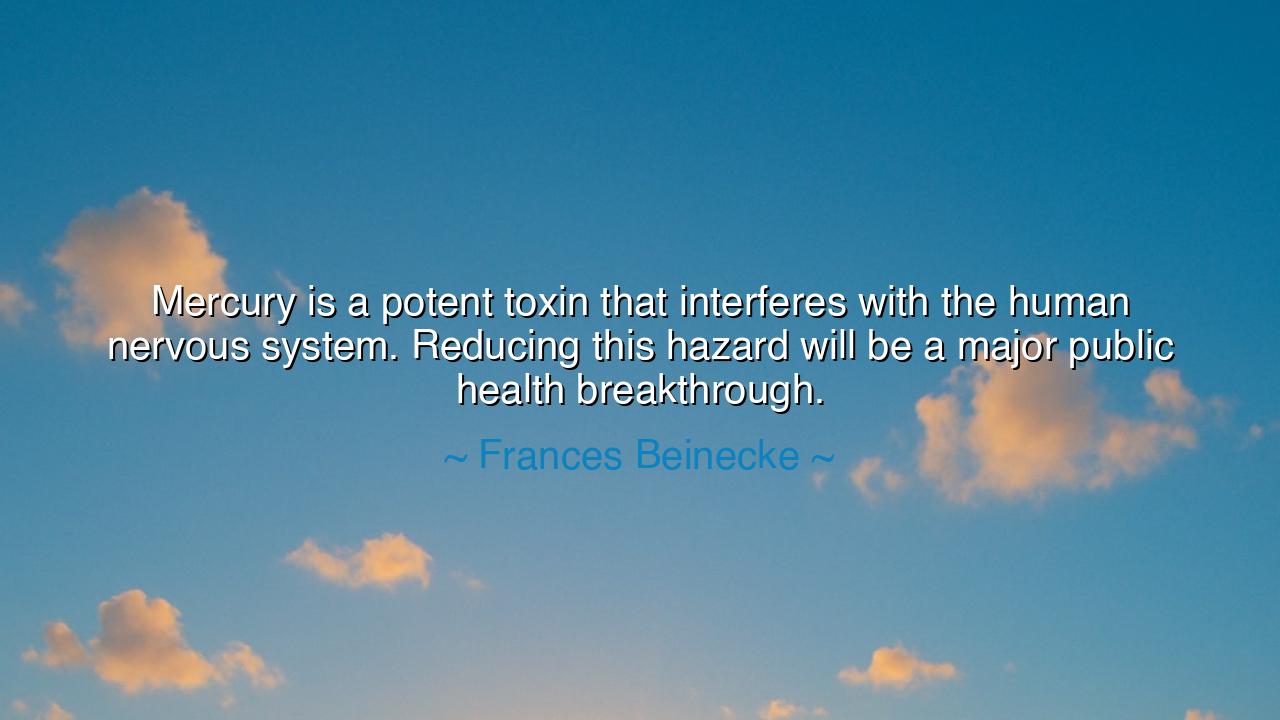
Mercury is a potent toxin that interferes with the human nervous
Mercury is a potent toxin that interferes with the human nervous system. Reducing this hazard will be a major public health breakthrough.






“Mercury is a potent toxin that interferes with the human nervous system. Reducing this hazard will be a major public health breakthrough.” — thus declared Frances Beinecke, a guardian of the Earth and defender of human life. Her words are not merely scientific in tone; they are prophetic in spirit — a cry from the heart of wisdom, calling upon humanity to awaken from its slumber of neglect. For in this warning lies a truth both physical and moral: that the poisons we cast into the world do not vanish — they return to us, entering our waters, our food, our children, and our future. She speaks of mercury, but her meaning reaches further — to every act of carelessness that severs the sacred bond between humankind and nature.
In the literal sense, Beinecke’s words address a grievous danger. Mercury, long used in industry, mining, and power generation, seeps unseen into the rivers and oceans. There, it transforms into methylmercury, a silent assassin that climbs the food chain — from plankton to fish, from fish to human — until it settles in the fragile labyrinth of the nervous system, where thought, movement, and memory dwell. Its victims are not only the miners and workers, but mothers and infants, whose lives are marked by what they never chose. Thus, when Beinecke calls for reducing this hazard, she calls for nothing less than the preservation of human dignity itself — the liberation of the body from invisible chains.
The history of mercury’s curse is long and tragic. In the middle of the 20th century, the world learned this lesson in the dark waters of Minamata Bay, Japan. There, for decades, a factory poured mercury-laden waste into the sea. The people of Minamata, who lived by fishing, ate what the ocean offered, unaware that their nourishment had become poison. The result was horror — trembling limbs, twisted speech, blindness, paralysis, and children born with broken bodies and silent minds. The sickness came to be known as Minamata disease, a wound that scarred both flesh and conscience. The cries of the afflicted became a hymn of warning for all humanity: that when we poison the earth, we poison ourselves.
Frances Beinecke, in invoking mercury, speaks as the inheritor of that warning. Her vision is not merely of science but of justice — of a world in which technology serves life rather than destroys it. To reduce this hazard, she says, would be a public health breakthrough, but it would also be a moral one. For the fight against toxins is the fight for wisdom — the understanding that progress without restraint is ruin, and that the health of the people cannot be separated from the health of the planet. True civilization is not measured by wealth or machines, but by how gently it walks upon the earth.
The ancients, too, knew this truth. In the temples of Greece, healers like Hippocrates and Asclepius taught that the body and the environment are one. The physician was also a protector of the air, the water, and the land, for he knew that disease begins where balance is broken. To cure a man while the world remains sick is to fight a battle with one’s hands tied. Beinecke revives this ancient wisdom in a modern tongue, reminding us that our public health depends not only on hospitals and medicines, but on rivers that run clean, air that is pure, and soil that yields life instead of poison.
The lesson, then, is both scientific and spiritual. We must guard against mercury not only as a metal but as a symbol — a mirror of our folly. The true danger lies not in mercury itself, but in our arrogance, our belief that the earth’s gifts are ours to exploit without consequence. Let every factory, every laboratory, every hand that shapes the world remember that creation and destruction walk side by side. The wise choose restraint, for they know that once the balance of nature is broken, the cost cannot be measured in coins, but in generations of suffering.
And so, my children of the modern age, heed the wisdom of Frances Beinecke. Do not see her words as a warning to scientists alone, but as a call to all who breathe and eat and dream. Reduce the hazard — in your choices, your industries, your governments, and your daily lives. Cherish clean water as the blood of the earth, and clean air as its breath. Support those who fight for environmental justice, for they are the true healers of this age. For when the day comes that the waters run pure again and no child is born poisoned by the greed of men, that day will indeed be a breakthrough — not only for public health, but for the human spirit itself.






AAdministratorAdministrator
Welcome, honored guests. Please leave a comment, we will respond soon